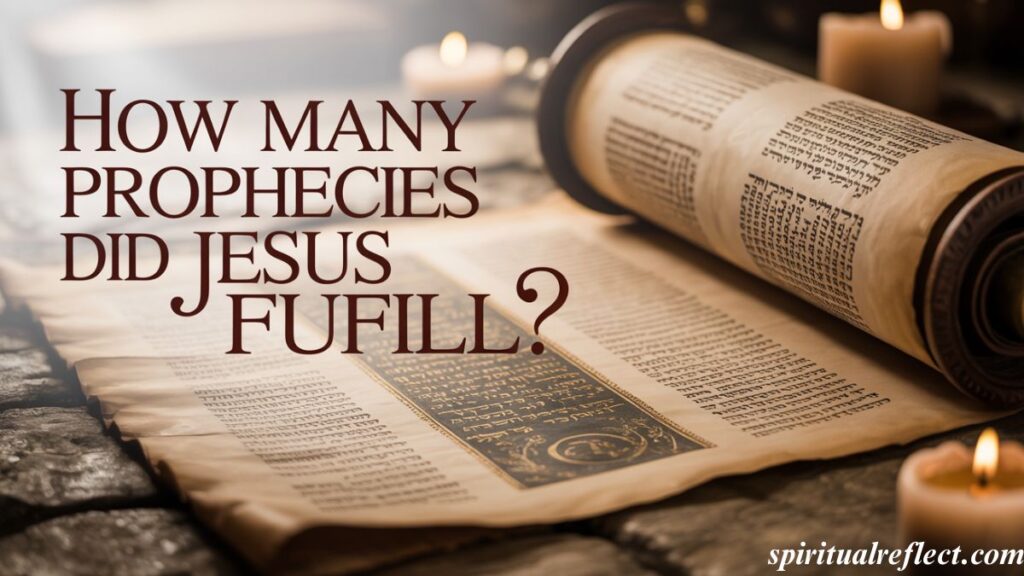The phrase “How Many Prophecies Did Jesus Fulfill?” refers to the study of biblical predictions in the Old Testament that Christians believe were realized through the life, death, and resurrection of Jesus Christ. These prophecies, recorded centuries before his birth, describe details about the coming Messiah—his lineage, birthplace, mission, suffering, and triumph. Scholars and theologians have spent centuries examining how these ancient promises align with the historical and scriptural accounts of Jesus found in the New Testament.
Throughout history, countless believers have been captivated by the remarkable alignment between Old Testament prophecies and the events of Christ’s life. It’s a story filled with divine precision, historical depth, and profound faith significance—a narrative so extraordinary that it continues to inspire both scholars and seekers today.
Exploring how many prophecies Jesus fulfilled isn’t merely about numbers; it’s about uncovering the intricate connection between God’s promises and their fulfillment in Jesus, offering timeless proof of the Messiah’s divine purpose and the enduring reliability of Scripture.
What Qualifies as a Prophecy?
Definition & types of prophecy
In Scripture, a prophecy generally refers to some declaration from God about future people, places, or events. However, the term covers a range of ideas:
- Predictive prophecy: statements clearly anticipating a future event (e.g., place of birth, manner of death).
- Typological or foreshadowing prophecy: earlier persons or patterns in Scripture serve as pointers toward future fulfilments (e.g., the Passover lamb pointing to Christ).
- Forthtelling vs. foretelling: some prophets speak into the present, not just the future—so classification matters.
How scholars and apologists classify them
When people ask, “How many prophecies did Jesus fulfill?”, they differ in what they count. Some count only explicit messianic prophecies (those predicting a future Messiah). Others include typological or indirect references. For example:
- Direct: “The Messiah will be born in Bethlehem” (Micah 5:2)
- Indirect or typological: “Out of Egypt I called my son” (Hosea 11:1) applied to Jesus’ return from Egypt.
All these distinctions matter when we tally numbers.
Why counting is complicated
Here are reasons the numbers differ:
- What counts as a “prophecy” depends on interpretation. Some verses are poetic, ambiguous, or viewed differently by Jewish and Christian traditions.
- What counts as “fulfilled” varies. Does quoting a Psalm in the New Testament mean fulfillment? Or does the event have to mirror the prophecy exactly?
- Do typological fulfillments count (the earlier event prefigured the later one) or only clear predictive prophecies?
Because of these grey areas, when one source says “over 300 prophecies fulfilled by Jesus,” it may be using broader criteria. Another might say “just 48 specific ones” using a stricter fence.
Estimates of How Many Prophecies Jesus Fulfilled
Conservative estimates
Some sources take a careful approach. For instance, GotQuestions.org states that while scholars have identified up to 574 Old Testament verses referring to the Messiah or his times, a conservative count is at least 300 prophecies fulfilled by Jesus.
Moderate to higher estimates
Other sources go further:
- One article claims He fulfilled more than 324 individual prophecies.
- Another site lists “over 300 prophecies… some believe it could be as high as 400.”
- Another chart lists 351 prophecies.
Why is there variance
The differences boil down to:
- Which Old Testament texts are counted (only explicitly messianic or all that could be applied to the Messiah)?
- Whether typological fulfillments are included (types, foreshadowings) or only explicit predictions.
- Whether the New Testament’s uses of Old Testament texts are taken as fulfilments or commentary.
- How one handles ambiguous passages (for example, a verse might be interpreted as messianic by Christians, but not by Jewish scholars).
What’s a sensible working number
Given the range, it’s reasonable to say:
“Scholars commonly estimate that Jesus fulfilled over 300 prophecies of the Old Testament.”
That figure captures the conservative end and recognises the evidence without exaggeration. It means you can operate with a range (e.g., 300–400) and focus on the significance rather than exact digits.
Key Categories of Prophecies and Notable Examples
Below are major categories of prophetic fulfilments and some of the most frequently cited examples.
Birth and Early Life
| Prophecy | Old Testament Reference | Fulfillment in Jesus | New Testament Reference |
|---|---|---|---|
| Born in Bethlehem | Micah 5:2 | Jesus born in Bethlehem of Judea | Jesus was born in Bethlehem of Judea |
| Born of a virgin | Isaiah 7:14 | Mary was conceived by the Holy Spirit | Mary conceived by the Holy Spirit |
| Called out of Egypt | Hosea 11:1 | Joseph, Mary & Jesus flee to Egypt and return | Matthew 2:14-15 |
These show how Jesus’ birth and early life are connected with Old Testament predictions about the Messiah.
Ministry and Identity
- Entry into Jerusalem on a donkey: Zechariah 9:9 predicted a king coming humbly and riding a donkey. Jesus rode one into Jerusalem (Matthew 21) as a deliberate fulfilment.
- Betrayal by a friend: Psalm 41:9 says, “Even my close friend in whom I trusted … has lifted up his heel against me.” The Gospel of John references this when Jesus speaks of Judas.
- Bones not broken: Exodus 12:46 & Psalm 34:20 say “not one of his bones shall be broken.” At Jesus’ crucifixion, the soldiers did not break his legs (John 19:33-36).
Death, Burial & Resurrection
Perhaps the most striking cluster of prophecies involves the crucifixion, burial, and resurrection of Jesus:
- Suffering servant imagery (Isaiah 53) describes someone “pierced for our transgressions” and “by his stripes we are healed.” Many Christians see this fulfilled in Jesus’ sacrifice.
- Pierced hands and feet, garments divided: Psalm 22 contains imagery that Christians connect to the crucifixion narratives.
- Resurrection / first fruits: Leviticus festivals (feast of first fruits) point typologically to resurrection. 1 Corinthians 15:20 calls Christ the first fruits of those who have fallen asleep.
Post-Resurrection & Ongoing Implications
While many prophecies relate to Jesus’ life on earth, some connect to the ongoing impact of his work:
- The spread of the gospel to all nations (e.g., Isaiah 49:6)
- The gathering of the redeemed (Isaiah 11:12)
- These are often viewed as ongoing or future fulfilments rather than single-event fulfilments.
Summary Table: Key Prophecies and Fulfillments
| Category | Example Prophecy | Fulfillment | Why It Matters |
|---|---|---|---|
| Birth & Early Life | Born in Bethlehem (Micah 5:2) | Jesus born in Bethlehem | Verifies messianic credentials |
| Identity & Ministry | Entry on donkey (Zechariah 9:9) | Jesus’ Palm Sunday ride | Connects King/Jewish context |
| Betrayal & Death | Jesus was born in Bethlehem | Judas betrays Jesus | Shows scriptural precision |
| Sacrifice & Resurrection | Suffering servant (Isaiah 53) | Jesus’ atonement and resurrection | Centers salvation narrative |
| Betrayed by a friend (Psalm 41:9) | All nations will know (Isaiah 49:6) | Global Christianity | Spread of the Gospel |
Why It Matters
Historical & Theological Significance
When you count the prophecies that Jesus fulfilled, you see more than curiosity. You see continuity between the Old and New Testaments. You see the Messiah whose coming was predicted long ago stepping into history. That matters because it strengthens the claim of Jesus as the promised Christ, the Son of God.
Faith and Apologetics
For many believers, the improbability of one person fulfilling hundreds of detailed predictions adds weight to their faith. For example, one calculation estimated the odds of fulfilling just eight specific prophecies at 1 in 10¹⁷.
Impact on Scripture Interpretation
When you believe many prophecies were fulfilled in Jesus, it changes how you read Scripture. You see the Old Testament not as isolated ancient texts, but as part of a unified story culminating in the New Testament. That influences faith, preaching, study, and application of the Bible.
Common Objections / Counterpoints
It’s important to note some caution:
- Critics say some prophecies are vague, or that the New Testament writers shaped events to match Scripture.
- Some Jewish scholars dispute the Christian interpretations of certain passages as messianic.
- Some prophecies are still considered “future” (in eschatology).
So the discussion doesn’t end with “number of prophecies fulfilled”. It also involves how they are counted, why they matter, and how interpreters view them.
Can One Person Really Fulfill Them All?
Statistical and Probability Arguments
When we say “over 300 prophecies fulfilled by Jesus,” it sounds huge—and it is. One leading apologist, Peter Stoner, calculated that the odds of one man fulfilling just eight of the prophecies would be 1 in 10²⁸.
Another illustration says: imagine covering the state of Texas with silver dollars two feet deep, one coin is marked; blindfold a man and ask him to pick that marked coin on his first try. That’s the odds of fulfilling just eight major prophecies according to one source. (Ministry127)
While these numbers are illustrative (and not exact scientific proofs), they underscore the claim: the more prophecies fulfilled by one person, the more astounding the case becomes.
Real-World Analogy
Think of someone writing a letter predicting a birth date, location of birth, manner of death, and many specific life events. Then imagine one person in history matches all the details. That’s the scale of what many Christians are arguing.
Scholarly and Theological Reassurance
Many Christian theologians and apologists make a few key points:
- The sheer number of fulfilled prophecies (300+) raises the bar for chance or luck.
- The diversity of prophecies (birth, death, identity, lineage, ministry) strengthens the case—not just one miracle, but an entire pattern.
- The fulfilment often occurs in minute detail (e.g., “not one bone broken”, “betrayed for thirty pieces of silver”).
Caveats and Nuance
To keep it balanced:
- The counts aren’t flawless. Some prophecies are interpreted differently in Jewish vs. Christian traditions.
- Counting methods vary—some include bold typology, others require explicit prediction.
- Some prophecies may yet be fulfilled (in the future or eschatological sense).
- Some objections question whether any man fulfilled all predicted aspects of the Messiah (for example, establishing global peace).
Thus, while the claim is strong, it invites thoughtful engagement—not blind agreement.
Summary Table: Prophecy Counts, Key Examples & What They Mean
| Estimate Range | What It Reflects | Representative Example Prophecies |
|---|---|---|
| ~300 prophecies | Conservative count of fulfilled messianic predictions | Virgin birth (Isaiah 7:14), Born in Bethlehem (Micah 5:2) |
| 300-400 prophecies | Broader count including typological and indirect fulfilments | Betrayal for 30 pieces of silver (Zechariah 11:12-13) |
| Hundreds of verses (450+) | Includes all Old Testament verses referencing Messiah or his times | Includes all Old Testament verses referencing the Messiah or his times |
Conclusion
The question “How Many Prophecies Did Jesus Fulfill?” points to one of the most powerful truths in the Bible. From his birth in Bethlehem to his resurrection, every detail of Jesus’ life reflects the fulfillment of ancient promises written hundreds of years earlier. These fulfilled prophecies reveal that his coming wasn’t random—it was part of God’s divine plan. Each verse, each event, connects the Old Testament to the New Testament like pieces of a perfect puzzle.
Understanding How Many Prophecies Did Jesus Fulfill? helps strengthen faith and trust in God’s Word. It shows that Scripture is consistent, accurate, and alive with meaning. For believers, these fulfilled prophecies are not just history—they are proof that Jesus truly is the Messiah, the Savior promised from the beginning. His story continues to confirm that every promise made by God finds its completion in Christ.
FAQs
Q: How many prophecies did Jesus fulfill?
A: Scholars commonly estimate that Jesus fulfilled over 300 prophecies, with some counts ranging up to 400 or more.
Q: Why don’t all studies agree on a number?
A: Because the counting depends on criteria: what qualifies as a prophecy, typological vs. direct fulfilment, and how one interprets Scripture.
Q: Are all prophecies fulfilled already?
A: Many Christians believe Jesus fulfilled the major ones tied to his first coming. Some prophecies remain future-oriented (in eschatology). Others see ongoing fulfilment.
Q: Where can I find detailed lists?
A: Charts and resources exist, such as the one on About-Jesus.org. (How Many Prophecies Did Jesus Fulfill?)

Rana Ahmad is the creator of Spiritual Reflect, where she shares insights on personal growth, mindfulness, and meaningful living to inspire a more intentional life.







